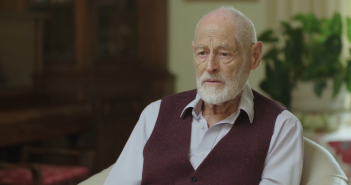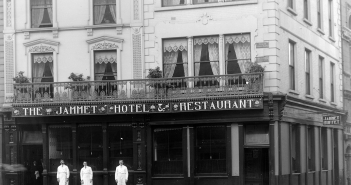Hardly a week goes by without someone asking me about my connection to Christopher Hitchens. Such enquiries are clearly predicated on our common concerns. I suspect at one level my own modest bohemianism and libertarianism has invited comparison. Although we share an unbridled enthusiasm for talking Hitchens was, however, also a great listener, something I am struggling to get better at.
I had a brief encounter with the man himself one enchanting and admittedly drunken evening. Being then youthful I was somewhat dazzled by his presence, yet more so when the bill for the wine and cognac arrived.
I found Christopher Hitchens almost preternaturally eloquent, even when plastered. Industrial quantities of booze only seemed to inspire him to new heights, as it does many artists. Nonetheless, he was fortunate to have the constitution of an ox – a unique case and liver to boot. Predictably, it was the cigarettes that killed him in the end.
Despite a dreadful personal lifestyle in conventional terms, his achievements and outputs – to use a terms whose origin in economics he would have despised – as the author, co-author, editor, or co-editor of over thirty books, were nothing short of phenomenal. Lifestyle excesses did not undermine his craft or genius.
Non-compromised Intellect
As a man of letters, Hitchens is the last in the line of a Belle Époque tradition requiring a confidence trick that Voltaire, George Orwell, Gore Vidal, Albert Camus and, truthfully, few others have pulled off. These were all men who operated in a space of utter independence and autonomy; as journalists not beholden to anyone; as non-compromised intellects, projecting intelligences greater than any academic-for-hire.
Hitchens himself was a generalist and synthesiser, a man of substance, far removed from the letter writer to a newspaper dismissed as a crank by those who control the message and form the opinions in our dumbed-down zeitgeist.
He played a role for which there is no job description, as it really does not exist, for he himself defined it through sheer force of will. Self-selected and self-ordained, he was truly a law unto himself.
It helped that the power brokers adored his transgressive presence. Walking on the wild side, he was a unique, larger than life character. Albeit toadying up to the powerful ultimately mars his legacy.
He was fortunate to receive the adulation of Americans, and of course he panhandled to them. They loved to debate with this antichrist of an atheist.
Perhaps they believed such a troubled human being seemed ripe for religious conversion, which of course he never succumbed to. In fact, the very religious doctor who supervised his dying days was anxious for a death bed conversion that never came, all of which is splendidly documented in his book Mortality (2012).
He might not like the comparison, but it seems to me that like many sincerely committed religious people he held an innocent faith that public debate matters: that serious argument around fundamental questions counts, and continues to shape public opinion.
Support for Invasion of Iraq
Hitchens’s blinkered support of the 2003 invasion of Iraq was based on hatred of religion in all its forms, and Islam in particular. He thus stands complicit by proxy in endorsing U.S. terrorism.
Hitchens failed to acknowledge that the US was acting as a terror state. When President Bush’s chief legal advisor Alberto Gonzalez described the Geneva Convention to be ‘quaint’ and ‘obsolete’[i] it opened to the door to the torture carried out in Guantanamo Bay and Abu Ghraib.
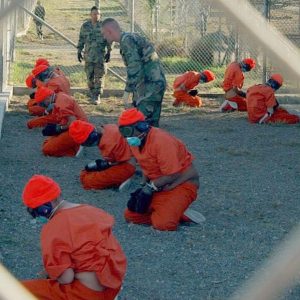
Guantanamo Bay.
Having said that at least Hitchens had the good grace to undergo the torture of waterboarding himself under controlled conditions, that he wrote about in a famous Vanity Fair article, declaring ‘Believe Me, It’s Torture.’[ii]
I happen to share Hitchens’s hatred of extreme religious fundamentalism and jihadi terror tactics, but am not oblivious to their origins, and the even greater danger posed by the maniacs on the far-right of the Republican Party in the U.S.: that triage of evil, Post-Truth, moral relativism and religious fundamentalism that Noam Chomsky has pointed to.
U.S. Republican extremists, unlike anarchists or deluded and fragmented Islamic jihadists possess true wealth and power, making them really frightening.
Moreover, on account of his British upbringing Hitchens was not exposed to the Catholic fundamentalism I have encountered, which is in some respects the worst, and certainly the pettiest, of all.
Attack on Bill Clinton
There is much to be said in favour of Christopher Hitchens. He was after all, the great Satan to the religious right, predicting, along with Richard Dawkins, the rise of religious fundamentalism, both Christian and Islamic. He saw it all coming.
He also saw our Post-Truth tendencies coming into being, most pertinently in his diatribe against Bill Clinton, No One Left to Lie To: The Values of the Worst Family (1999).
Indeed, Clinton was the beginning of the end. Bubba is like a fractured image of Trump and Steve Bannon and precursor to their redneck populism. With his forensic mind, Hitchens knew a spin merchant when he saw one.
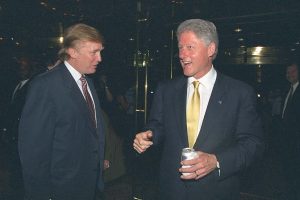
Bill Clinton with Donald Trump c.2000.
Hitchens recognised Clinton as a Populist vulgarian, and ultimately a betrayer and subverter of the liberal cause. He could see that Clinton’s lack of spine, principle and integrity would allow the Neo-Cons to undermine the liberalism he claimed to stand for.
Clinton is a hillbilly product of an educational system prioritising policy wonking. Today we see far too much emphasis on graft and data retention along with carefully managed communication, which is the obverse of true argumentation. Thus discussion and debate is confined within ever-narrowing parameters.
Hitchens’s commitment to the Enlightenment values of reason and truth unquestionably dictated an intense dislike of the purveyors of Post-Truth nonsense.
Hitchens was not, however, as critical of U.S. neo-liberalism as he ought to have been, and his departure from Marxism led to obsequiousness towards the establishment. This ideology, or ‘false consciousness’ in Marxist terms, is laying waste to the world and Hitchens should have seen it coming.
Perhaps the cognitive dissonance, can be explained in material terms by this intellectual Marxist being on the neo-liberal payroll. He was where the money was, representing the opposing, other times supportive, viewpoints on Fox News. Yet he remained danger to all comers, a white knuckle ride on an unruly horse.
The Bonfire of the Vanities
In a sense Hitchens was intellectually mediocre, not unlike Jordan Peterson in that he pandered to the corporate market. The neo-liberal banqueted intellectual, who keeps it safe and ted-talky. Anything can be resolved by one market under god. Well no it cannot.
Thus, by side-tracking to Islam, supporting the Bushman wars and demonising Clinton he perversely and indirectly served Republican interests. His Marxism twisted and bent like a tattered cover effectively brought endorsement of U.S-led neo-liberalism.
Hitchens had an opulent and luxurious lifestyle, and I believe it blurred his judgment. Money can corrupt anyone. Indeed, a character in Martin Amis’s book Money (1984) was ostensibly based on him.
He liked to be indulged, flattered and entertained, and craved an audience too much. The scoop was all important. A neediness to be the centre of public attention was an obviously failing.
Hichens’s unscrupulous lifestyle, alcoholism and opportunism, some say, is also fictionally documented in Tom Wolfe’s iconic 1980s novel The Bonfire of The Vanities (1987). The fictional character that emerges is far from sympathetic.
That is not say he was not mostly correct in his arguments. We should judge the ideas rather than the man, who must have been difficult to live with.
Above all, Christopher Hitchens maintained the idea of public intellectualism, and was a champion of any cause he firmly believed in. He was like a successful Ignatius F O’ Reilly railing against a Confederacy of Dunces (1980), operating in what Gore Vidal termed ‘The Republic of Amnesia.’
Interestingly, Vidal anointed him as his successor and dauphin. But perhaps unsurprisingly they had a falling out, given there is little of the austere Brahmin in Christopher Hitchens.
Though he might bridle at the suggestion, Hichens is more like the smooth-talking William F. Buckley, the architect of U.S. neo-liberalism, at least in personality terms. A fractiousness and emotional incompatibility between Buckley and Vidal is also easy to detect in Best of Enemies, a recent documentary about their famous debates and interchanges during the 1968 U.S. Presidential Election.
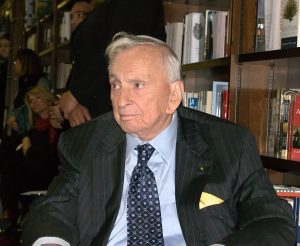
Gore Vidal, 2009. Image: David Shankbone
A One-Off
Hitchens’s sheer force of personality and will is unlikely to be seen again any time soon. Even his enemies would concede he was a one-off, a public entertainer of such colour and intellect that he was guaranteed to give a performance, and unlike in Franz Kafka’s The Hunger Artist (1922), the public never tired of it.
But the heroic lifestyle, involving so much booze, and stage fright no doubt, killed him prematurely. We can, however, draw a few lessons from his intellectual legacy.
First, to be vigilant to public discourse being hijacked by spin merchants, quacks, false expertise and imbeciles that we now seem to be buying wholesale.
Secondly, to listen carefully to those who speak consequentially and even cause the necessary offence. These kind of people are being obliterated or subsumed by mindless internet chatter, and sound bites. As Hitchens famously said: ‘My own opinion is enough for me and I claim the right to defend it against anybody, anywhere and if you do not like it stand in line while I kick your ass.
Thirdly, to recognise that our moral compass of truth is being lost to a religous fundamentalism that appears to be winning.
Fourthly, we must question the pillars of society just as Hitchens interrogated the roles of Mother Teresa, Bill Clinton and Henry Kissinger, to devastating effect.
His book on Mother Theresa is in fact incendiary. The title the Missionary Position: Mother Teresa in Theory and Practice (1995) is a pun of true genius containing a veiled attack on Catholic attitudes towards sexuality, and so called charity.
Hitchens fillets her to show how the ostensible compassion and charity was really a mask for leaving people to die in appalling conditions, without adequate support mechanisms or proper treatment; in short demonstrating that she was a hypocrite.
Master of the Polemic
Excessively religious people like to be seen to be good as opposed to doing good. Tokenism holds sway. Many devoutly religious people I knew were all in favour of the Innocence Project I founded in Ireland; that is as long as it did not interfere with their interests, and of course funding was out of the question.
Hitchens was the acknowledged master of the polemic, and revived the tradition of the public essay. In this sense his easily digested and short books – beautifully written, precise and pungent – are not just in the line of his great hero George Orwell, but owe a debt also to the tradition of 18th century Anglo-Irish letters, encapsulated by figures such as Jonathan Swift or William Hazlitt.
His work could also be profoundly serious, at which point he ceased to be just a polemicist. His public education text on The Rights of Man (2006), juxtaposing Thomas Paine and Edmund Burke is a perfect summary of the values of the constitutional Enlightenment. It condenses a lot of learning and is far better than many large treatises on the subject that go unread and unremembered.
I sense that he appealed to his contemporary audience as a generalist confronting legions of specialists. His ranging intellect contrasted with the products of an educational system that no longer permits all-rounders. When he engaged in his ideal forum of public debate he simply knew too much, and was too articulate with a ready supply of historical and literary allusions that dumbfounded his critics, putting the political spinmeisters on the back foot.
He achieved glory by unconventional methods, to put it mildly, and it must have astounded him that a third class degree, admittedly from Balliol in Oxford University, brought him so far. He bucked the specialist trend.
One Man Show
I wonder whether such a ribald, Rabelaisian figure of jollity and deadly accuracy could gain traction with an audience today. Where would his footholds to glory lie? His unruly lifestyle in these censorious times would probably ensure that he never got past first base.
At one level it was all a kind of performance. A one man show that went on and on. The clown prince. But what a show it was.
What his opponents lacked, and he possessed in spades, was depth and interdisciplinary context, and above all else a genius for sharp communication and barbed wit. He used words to nuclear effect and with antennae raised to the fraudulence and hypocrisy of our times.
He is sadly missed, for our real foes of Post-Truth, moral relativism and the repudiation of Enlightenment values hold a vice-like grip over public consciousness.
I suspect he was also a little big man, a voice that just had to be heard. Perhaps his oversized personality was a compensation for social maladjustment, and even Asperger Syndrome or similar. Like Oscar in Gunter Grass’s The Tin Drum (1959) he banged on for the sake of the marginalised and those classified as deviant.
It was the transposition of his erudition and learning in a practical sense to the issues of his time that also defined him. Given the context in which he operated, his life was a minor miracle. A last popular gasp of learning and context that gained traction and a mass audience.
He once said that our lives only have meaning to the extent that we give them meaning, which is not to condone his attitude towards the women or the booze.
There was a craving for middle class acceptance for which he had to overcome an inherent vulgarity and crassness. America suited him as a pundit and pugilist of an anti-intellectual vulgarity, who could speak at their level. Being of a kind, he recognised the flaws in Clinton.
He was never quite an English gentleman. Never officer material.
In America he was one step, in savvy terms, above the vulgarity around him but still appealed at a frat-boy level. For in the kingdom of the blind man the one eyed man is king.
[i] Roland Watson, ‘Geneva accords quaint and obsolete, legal aide told Bush’, The Times, March 19th, 2004, https://www.thetimes.co.uk/article/geneva-accords-quaint-and-obsolete-legal-aide-told-bush-q2dqw8f3pz9
[ii] Christopher Hitchens, ‘Believe Me, It’s Torture, Vanity Fair, August, 2008, https://www.vanityfair.com/news/2008/08/hitchens200808


